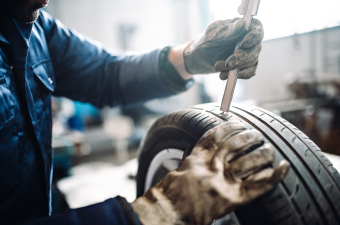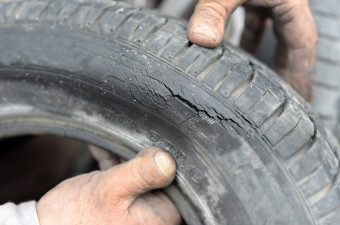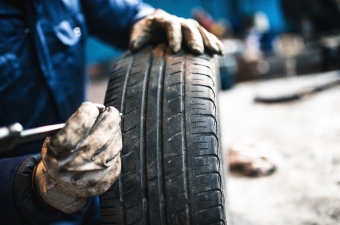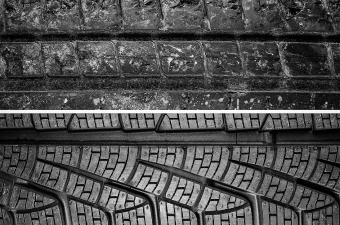



When you need to get your car tyres checked in Dorset, whether it’s a problem with worn tread, damage from kerbing or cuts or cracks of your tyres, we’ll check your car tyres over and identify the problem for FREE and then repair or replace your tyres.
Our free tyre check enables you to find out what the problem is, and then have a repair or replacement carried out by a qualified car mechanic in Dorset.
After all, you want to stop the little problems becoming bigger ones when you need a car tyre check in Dorset.
01747 897 350
| Monday | 08:30 - 17:45 |
| Tuesday | 08:30 - 17:45 |
| Wednesday | 08:30 - 17:45 |
| Thursday | 08:30 - 17:45 |
| Friday | 08:30 - 17:45 |
| Saturday | Closed |
| Sunday | Closed |

Darren has worked in the car service business for many years, having previously worked for Halfords Autocentres and owner of a HIQ franchise.
Darren is brilliant at looking after customers and making sure they get the best deal in Dorset.
But don’t just take our word for it, read the reviews our customers have left us on Google Reviews.
Totally recommend. Had a lovely experience with this company thanks to Chris who did everything to have a smooth transaction.

Trustworthy and easy to deal with. Great service, really pleased with my car and the service I received before and after the sale. Thanks to Chris and Gemma who helped me out.

The past purchase. They are a very embolizing company I brought a vw passat estate there 12 years ago & yes its still going with the 3rd owner not me!

We have over 30 years of combined experience of repairing and replacing tyres in Dorset. We can diagnose and repair/replace any make of car regardless of age as we have all the latest computer and diagnostic equipment that some of the latest cars need for a tyre repair/replacement to be completed safely.
Getting your car fixed is our number one priority, which is why you can speak direct to the mechanic repairing your car as you are our number 1 priority.
Once you’ve booked your car for a free check, we’ll diagnose what the problem is for free before we quote you for the repair or replacement needed to get your car tyres properly fixed.
Once we’ve identified the problem, we’ll quote you a fixed price for the repair with no hidden extras.
Think of tyre labels as a sort of grading system; tyres are ranked in terms of fuel consumption, wet grip and noise classification. Tyres with the highest rating are measured ‘A’, down to the lowest rating of ‘G’. All of our tyres have labels attached so you can be clear on what you are purchasing for your vehicle.
Our reputation means a lot to us, so the service we supply to our clients is of utmost importance. But don’t just take our word for it, check out our reviews on Google.
Tyres that are over-inflated can be dangerous as the greater the inflation, the more difficult it is for the tyre to maintain contact with the road and allow the tread to establish grip. In addition, the more pressure you put into the tyre, the more stress you put the structure of the tyre under, shortening the tyres lifespan.
Recent research has suggested that as many as 60% of domestic vehicles on the roads in Europe have lower tyre pressures than recommended. Under-inflation could lead to any or all of the following:
Cracks and bulges can be caused by hitting a pothole or kerb. This can cause cracks in the sidewall of the tyre. Over or under-inflation of tyres can make this problem more likely to occur and can only be fixed by replacing the tyres altogether.
If you are regularly driving at speed, for example motorway driving, your tyres are at a higher risk of damage. Contact with road hazards such as potholes at high speeds can cause a higher degree of damage whilst the overheating due to driving at higher speeds can cause tyre damage and a loss of control when driving.
Tyres can become more worn on one side – known as camber wear – due to misalignment. Misalignment can be caused by hitting a kerb or general wear and tear as well as adjusting the height of the vehicle. A misaligned tyre should be refitted or replaced as it can reduce the tyre’s traction and grip on the roads.
Puncture damage is rarely the fault of the driver but the result of broken glass on the road, for example. Ensuring that your tyres are properly inflated can increase your defense against punctures.
Emergency braking can lead to instant tyre wear in a very specific area. Ultimately, this can lead to deflation and obscure vehicle handling if left too long. If you have to carry out an emergency stop, check your tyres for any localised wear!
General wear and tear cannot be avoided but it is important to monitor your tyre’s tread depth in order to ensure it is within the legal limit. If the tread depth is below 1.6mm, you cannot legally drive on the roads and must replace your tyres. However, this level is the absolute minimum and we recommend replacing your tyres before they reach this level to increase performance and safety.
Tyres that are over-inflated can be dangerous as the greater the inflation, the more difficult it is for the tyre to maintain contact with the road and allow the tread to establish grip. In addition, the more pressure you put into the tyre, the more stress you put the structure of the tyre under, shortening the tyres lifespan.
Cracks and bulges can be caused by hitting a pothole or kerb. This can cause cracks in the sidewall of the tyre. Over or under-inflation of tyres can make this problem more likely to occur and can only be fixed by replacing the tyres altogether.
Tyres can become more worn on one side – known as camber wear – due to misalignment. Misalignment can be caused by hitting a kerb or general wear and tear as well as adjusting the height of the vehicle. A misaligned tyre should be refitted or replaced as it can reduce the tyre’s traction and grip on the roads.
Emergency braking can lead to instant tyre wear in a very specific area. Ultimately, this can lead to deflation and obscure vehicle handling if left too long. If you have to carry out an emergency stop, check your tyres for any localised wear!
Recent research has suggested that as many as 60% of domestic vehicles on the roads in Europe have lower tyre pressures than recommended. Under-inflation could lead to any or all of the following:
If you are regularly driving at speed, for example motorway driving, your tyres are at a higher risk of damage. Contact with road hazards such as potholes at high speeds can cause a higher degree of damage whilst the overheating due to driving at higher speeds can cause tyre damage and a loss of control when driving.
Puncture damage is rarely the fault of the driver but the result of broken glass on the road, for example. Ensuring that your tyres are properly inflated can increase your defense against punctures.
General wear and tear cannot be avoided but it is important to monitor your tyre’s tread depth in order to ensure it is within the legal limit. If the tread depth is below 1.6mm, you cannot legally drive on the roads and must replace your tyres. However, this level is the absolute minimum and we recommend replacing your tyres before they reach this level to increase performance and safety.
The simple answer is yes. Our mechanics have been trained to repair all makes – in fact it’s what they enjoy, repairing all different types of cars rather than one make of car in a dealership. That’s why we tend to get the most experienced car mechanics in Dorset working for us as they love the variety of repairs they get to do – no day is the same. But just to confirm, we can carry out a repair on all major car makes and models.
Yes – we don’t charge you to diagnose a problem. We then give you a free quote for a fixed price repair. We only charge you when you are happy with our price and you ask us to proceed with the repair to your tyres.
Our mechanics and technicians are trained and kept up to date with the latest repairs almost all makes and model. But to confirm we have mechanics in Dorset that can repair all major car makes and models.
We have the latest diagnostics equipment so we can reset any warning light that comes up on your dashboard, including some of the more expensive cars like Mercedes, Audi and BMW that have very sophisticated onboard electrics. But rest assured, we can switch off any warning light with our diagnostic equipment.